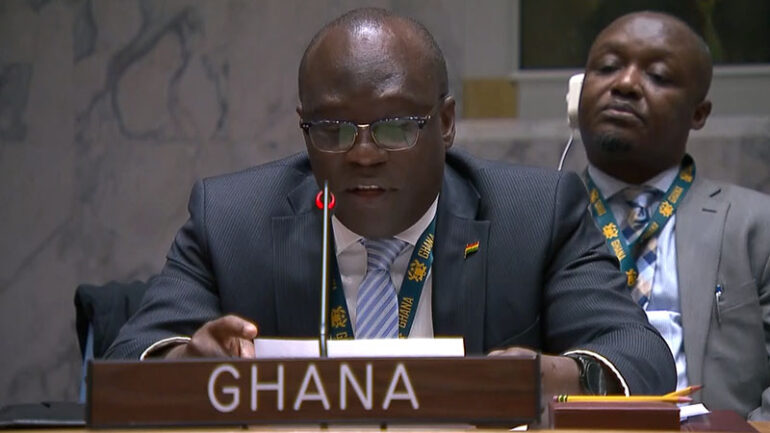International Residual Mechanism for Criminal Tribunals

Madam President,
Since this is the first briefing of Judge Graciela Gatti Santana as President of the International Residual Mechanism for Criminal Tribunals (the Mechanism) to this Council, I wish to congratulate her on her appointment and thank her for the forward-looking and proactive briefing, which provides Council members with an overview of the progress of work as well as the challenges facing the Mechanism. I also take this opportunity to pledge Ghana’s support to her tenure. To the Prosecutor of the Mechanism, Mr. Serge Brammertz, I congratulate you on your re-election and also thank you for the briefing.
Madam President
My delegation acknowledges the important role of the Mechanism in ending impunity and bringing perpetrators of atrocity crimes to justice and will support every effort and work constructively with other delegations in this regard.
With regard to the contents of the report, Ghana will like to make the following four points:
On cooperation, Ghana continues its call on all States to cooperate with the Mechanism in accordance with applicable laws by handing over fugitives to enable the judicial process to continue and be completed. It may be noted that 152 States have said “no to atrocity crimes” through the Genocide Convention and we urge those States that are still harbouring identified fugitives to hand them over in fulfillment of their international obligations. We also call for the cooperation of States in the enforcement of sentences and take this opportunity to thank Austria, Belgium, Estonia, Finland, France, Germany, Italy, Norway, Poland, Sweden and the United Kingdom of Great Britain and Northern Ireland for assuming additional responsibilities by agreeing to enforce the sentences of one or more convicted persons and to encourage those considering enforcing sentences in the future to do so.
Ghana has always maintained that as a comity of nations, we have a collective Responsibility to Remember the survivors and families of victims of these atrocity crimes that have been committed and to sustain the demands of justice and accountability without limitation over time. We underscore the fact that the wheels of justice may sometimes grind slowly, however, it is also our collective Responsibility to seek justice for them by holding accountable the perpetrators of the heinous crimes of atrocity. The only way these survivors and the families of victims can find closure is for the perpetrators of such heinous crimes to be brought to justice.
Ghana takes note with appreciation of the forward-looking plans as well as the roadmap that gives this Council some clarity on the Mechanism’s residual functions, future workload as outlined in phases one to three, and possible options for future institutional change. This is a positive development for Ghana and we look forward to further engagement with the Mechanism, through the Working Group, in respect of possible changes to the mandate with a view to assisting with the implementation of the roadmap.
Ghana recalls Security Council Resolution 2529 (2020) article 4, which emphasised the importance of relocating persons who have been acquitted or have completed their sentences expeditiously and durably and called on states to cooperate and assist the Mechanism in doing so. Ghana wishes to draw attention to the challenges facing the Mechanism in the implementation of the Resolution. It is pertinent to state that the international justice community has to pay attention to and resolve the situation of the acquitted and the released persons who have completed their sentences. The continued lack of liberty of these persons remains a stain on international justice and perpetuates a well-founded criticism that international justice has failed to ensure and implement fundamental human rights. As we commend the efforts of the Registrar for using diplomatic, political, and judicial avenues to resolve some of the challenges, we call on this Council to critically discuss the matter with an outcome that will assist the Mechanism in line with resolution 2637(2022). Preambular paragraph 5 of the resolution stated and I quote “Notes that decisions on the relocation of persons who have been acquitted or completed their sentences should take into account inter alia the readiness of the state of origin to accept its nationals, the consent or any objections raised by the individuals to be relocated and the availability of other relocation states”. Ghana is convinced that paragraph 5 sets the tone for an in-depth discussion by this Council. The proposal is being made against the backdrop that more of such persons will be released in the future and faced with the fact that not many states have expressed interest in taking in these persons of late, how long will the Mechanism continue to take such responsibilities which also has budgetary implications.
Finally, Ghana notes with appreciation the collaboration between the Office of the Prosecutor and the national prosecutions by providing them with access to evidence and information in response to a high volume of requests for those crimes. This is a positive development as it helps in building the capacities of the Officers in the national prosecutions of the affected countries.
I thank you Madam President.
